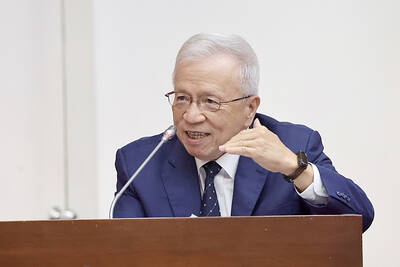Evergreen Marine Corp (長榮海運) yesterday said it holds a conservative outlook for this year as the US-China trade dispute has slowed the growth of Asian exports to the US, but added that it would improve its edge by using 58 new vessels in the Southeast Asian market.
The shipping company saw its revenue for the first five months jump 24 percent from a year earlier to NT$77.1 billion (US$2.48 billion), as its freight volume to the US and Southeast Asia has expanded, Evergreen Marine chairman Anchor Chang (張正鏞) told reporters after a shareholder’s meeting in Taoyuan.
The shipping arm of Evergreen Group (長榮集團) said it previously forecast that the US-China trade dispute would ease last month and was surprised that US President Donald Trump added to tariff hikes.
“We thought that we would have to battle against headwinds, but it turned out that we secured a lot of long-term contracts, as our clients trusted us and aimed to secure space amid uncertainty stemming from the trade dispute,” Chang said.
Apart from Dragon Boat Festival week, Evergreen Marine has since April sent vessels to the US with almost all of their containers full, he said.
The company’s freight volume to ASEAN members has grown stably this year, after annual increases of 15 percent in the past two years, Chang said.
With the trade dispute increasing the rate that companies are moving production from China to ASEAN, Evergreen Marine would find growth momentum with Vietnam, Thailand, Indonesia, Malaysia, Cambodia and the Philippines, he said.
Evergreen Marine has purchased 58 vessels of 1,900 to 2,800 twenty-foot equivalent units (TEU), as most ports in the region can only accommodate smaller vessels, Chang said.
So far, the company has taken delivery of 18 2,800 TEU vessels, and would take delivery of another 40 by 2022, he said, adding that it would decommission aged vessels when the new ones are received.
Evergreen Marine’s total freight volume would increase in line with global market growth, or an average of 4 to 5 percent within the next five years, he said.
The trade dispute has affected shipping businesses worldwide, with the growth of Asian exports to the US sliding to only 1 percent so far this year, Evergreen Marine president Eric Hsieh (謝惠全) said, adding that imports to China have also dropped.
With higher standards for fuels with lower sulfur content to take effect in January next year, the company has taken a lead over its peers by purchasing 130 scrubbers for its vessels, Chang said.
Evergreen shares yesterday shed 0.4 percent to close at NT$12.45, while the group’s airline arm, EVA Airways (長榮航空), saw its share price plunge 3.85 percent to NT$15, with investors pessimistic over strike action launched by the airline’s union, Taiwan Stock Exchange data showed.

JITTERS: Nexperia has a 20 percent market share for chips powering simpler features such as window controls, and changing supply chains could take years European carmakers are looking into ways to scratch components made with parts from China, spooked by deepening geopolitical spats playing out through chipmaker Nexperia BV and Beijing’s export controls on rare earths. To protect operations from trade ructions, several automakers are pushing major suppliers to find permanent alternatives to Chinese semiconductors, people familiar with the matter said. The industry is considering broader changes to its supply chain to adapt to shifting geopolitics, Europe’s main suppliers lobby CLEPA head Matthias Zink said. “We had some indications already — questions like: ‘How can you supply me without this dependency on China?’” Zink, who also

At least US$50 million for the freedom of an Emirati sheikh: That is the king’s ransom paid two weeks ago to militants linked to al-Qaeda who are pushing to topple the Malian government and impose Islamic law. Alongside a crippling fuel blockade, the Group for the Support of Islam and Muslims (JNIM) has made kidnapping wealthy foreigners for a ransom a pillar of its strategy of “economic jihad.” Its goal: Oust the junta, which has struggled to contain Mali’s decade-long insurgency since taking power following back-to-back coups in 2020 and 2021, by scaring away investors and paralyzing the west African country’s economy.

BUST FEARS: While a KMT legislator asked if an AI bubble could affect Taiwan, the DGBAS minister said the sector appears on track to continue growing The local property market has cooled down moderately following a series of credit control measures designed to contain speculation, the central bank said yesterday, while remaining tight-lipped about potential rule relaxations. Lawmakers in a meeting of the legislature’s Finance Committee voiced concerns to central bank officials that the credit control measures have adversely affected the government’s tax income and small and medium-sized property developers, with limited positive effects. Housing prices have been climbing since 2016, even when the central bank imposed its first set of control measures in 2020, Chinese Nationalist Party (KMT) Legislator Lo Ting-wei (羅廷瑋) said. “Since the second half of

Taiwan Semiconductor Manufacturing Co (TSMC, 台積電) received about NT$147 billion (US$4.71 billion) in subsidies from the US, Japanese, German and Chinese governments over the past two years for its global expansion. Financial data compiled by the world’s largest contract chipmaker showed the company secured NT$4.77 billion in subsidies from the governments in the third quarter, bringing the total for the first three quarters of the year to about NT$71.9 billion. Along with the NT$75.16 billion in financial aid TSMC received last year, the chipmaker obtained NT$147 billion in subsidies in almost two years, the data showed. The subsidies received by its subsidiaries —